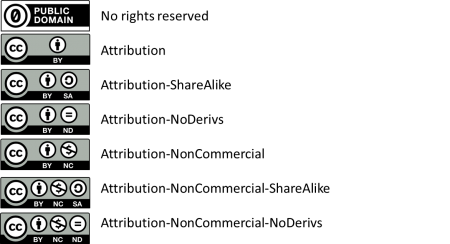Creative Commons 
Creative Commons is a non-profit organization that created a set of simple, easy-to-understand copyright licenses. These are legally enforceable licenses that allow creators to mark a work with permission to make a variety of uses, with the aim of expanding the range of things available for others to share, quote, adapt, and build upon.
Creative Commons licenses do two things:
- They allow creators to share their work easily
- They allow everyone to find work that is free to use without permission
As long as you obey the terms of the license attached to the work, you can use Creative Commons licensed material without fear of accidentally infringing someone’s copyright.
Why apply a CC liscense?
OU Libraries encourage the use of Creative Commons licenses because they help communicate information about copyright holders’ intentions and thus help everyone know what may be used and what uses would require further permission. They help authors and creators manage their copyrights and share their creative work without losing control over it. Further, Creative Commons licenses facilitate creators’ rights by communicating clearly a contact for permission when appropriate.
Supplementing your existing copyright with a Creative Commons license can help you manage your copyrights and share your works without losing your rights.
Read more about Creative Commons.
Creative Commons licenses
There are six core Creative Commons licenses to choose from, each allowing for different kinds of permitted uses for the work in question. A Creative Commons license can be applied to anything covered by copyright law, but are not to be used with computer software.
Types of Creative Commons licenses:
*For more on CC licenses and how they are used read descriptions on the CC website and or download this guide.
How to get started using a CC licenses
Go to Creative Commons license chooser website and select appropriate liscense. Copy and paste liscense into your work.
Microsoft has a CC liscnes plug-in that can be downloaded and used to embed CC licenses into Word and Powerpoint documents.
Publishing Support
- Author Rights
- Selecting Where to Publish
- Understanding Open Access
- Open Access Fund
- Funding Mandates
- Publisher Agreements
Library Contact
Julia Rodriguez
Scholarly Communications Librarian
juliar@oakland.edu





